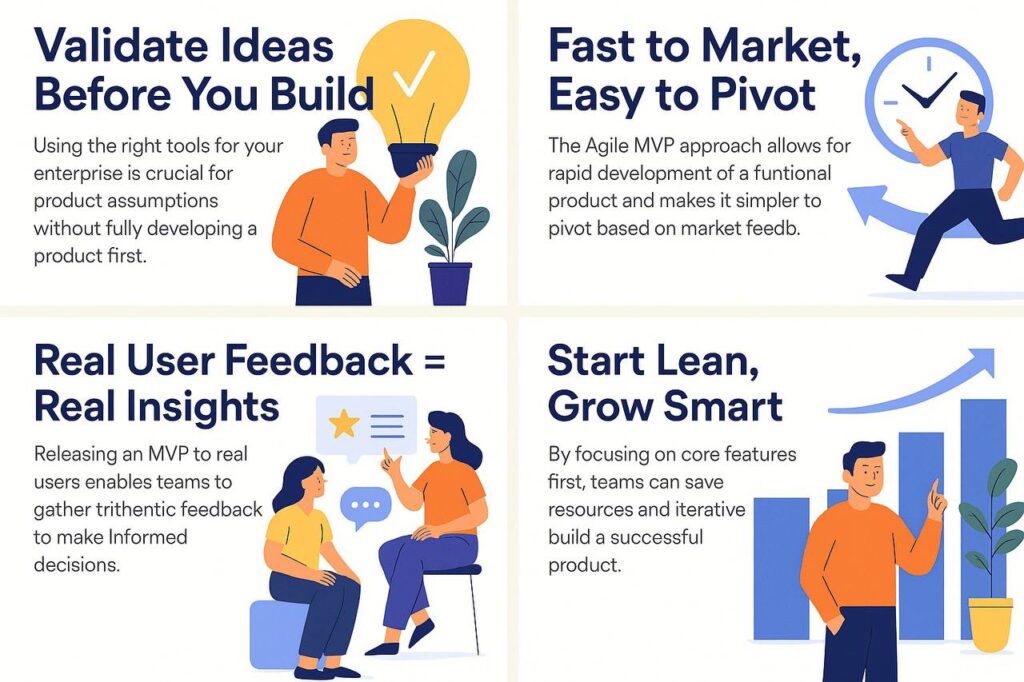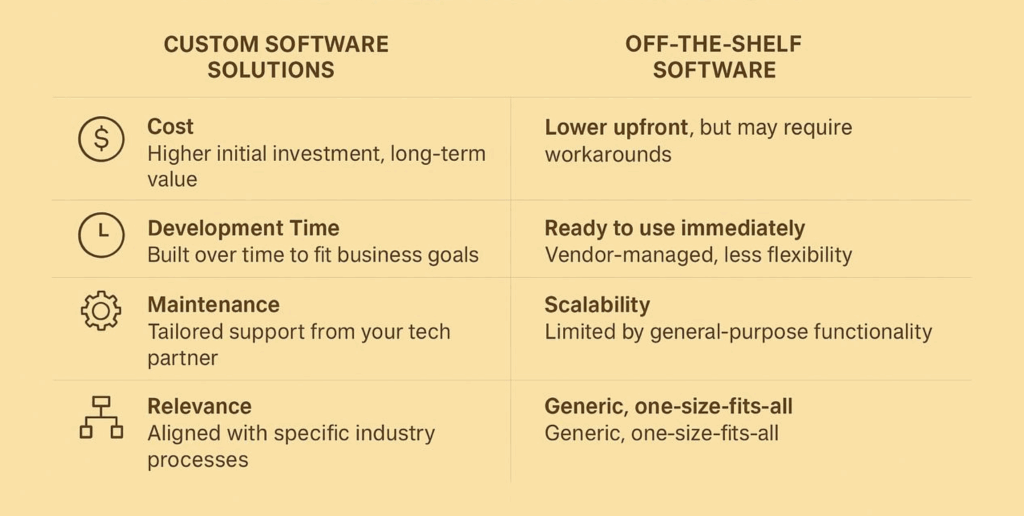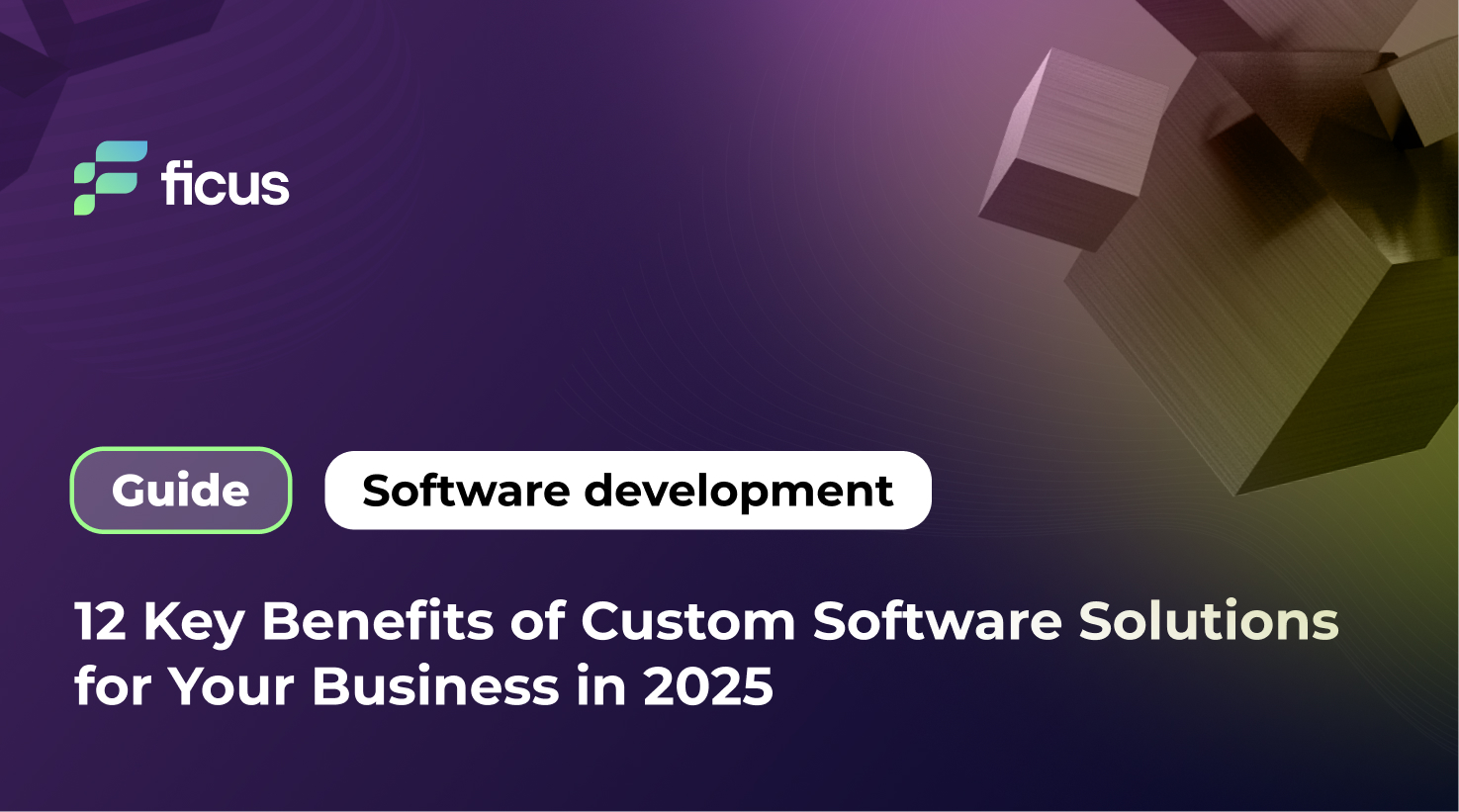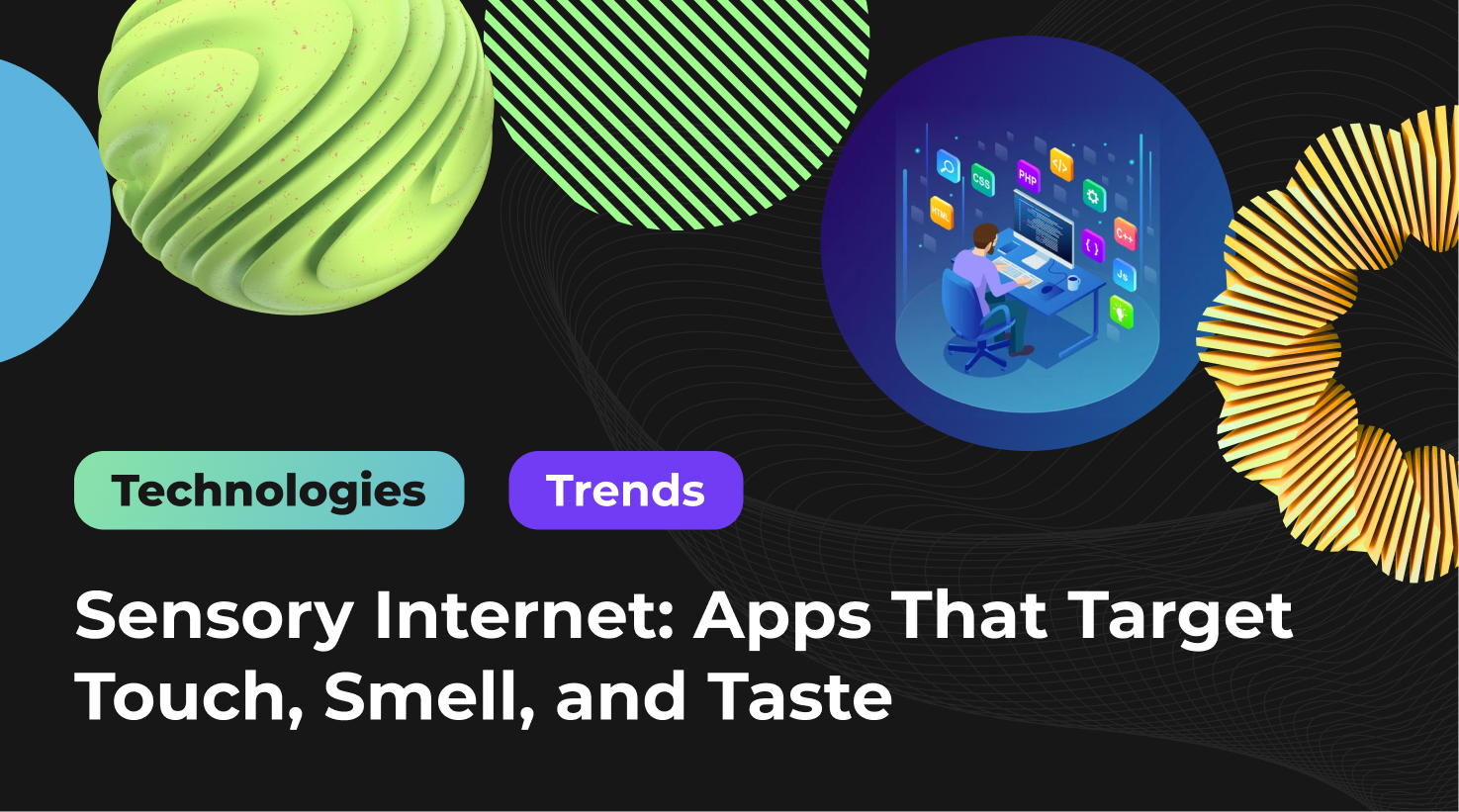Off-the-shelf software might work for small teams or one-size-fits-all workflows — but as your business scales, its limitations become costly. In 2025, digital success requires more than plug-and-play solutions; it demands custom software that adapts to your goals, not the other way around.
Custom software is built to fit your exact business logic, infrastructure, and user needs.
It can automate what matters most, reduce manual work, close security gaps, and evolve with you — giving you a competitive edge in a fast-moving market.
In contrast, relying on rigid or bloated third-party tools often leads to inefficiencies,
integration headaches, and missed opportunities.
That’s where Ficus Technologies steps in — helping companies build lean, reliable,
and scalable systems tailored to real-world needs.
- Custom software aligns directly with your unique business goals and workflows.
- Scalability, security, and seamless integration are built in—not bolted on.
- Custom tools reduce tech debt, improve maintainability, and offer long-term ROI.
What Is a Software Solution?
A software solution is a purpose-built application or system designed to address specific business needs or challenges. Unlike generic tools, it solves targeted problems — whether it’s automating workflows, streamlining communication, managing data, or supporting customer operations.
Software solutions can be custom-built to fit your unique business logic or off-the-shelf for general use. In this article, we focus on custom software solutions — tailored, flexible systems that evolve with your goals and infrastructure.
Let’s explore the 12 most relevant benefits of software solutions this year and how they’re helping companies thrive:
1. Built for Your Business Goals
Unlike one-size-fits-all tools, custom software is developed to reflect your company’s unique processes, workflows, and challenges. It is designed from the ground up to support your operational strategies, goals, and priorities. You don’t have to bend your processes to fit the software—the software fits you. This level of alignment helps you streamline operations and improve organizational efficiency.
- Why it matters in 2025: Custom tools help cut through digital noise, streamline operations, and maximize ROI in highly competitive environments.
2. Future-Proof Scalability
Custom software is inherently scalable. You can start with the core features your business needs today and expand functionality as your operations grow. Whether it’s handling more users, processing more data, or integrating new tools, tailored software can evolve with you. Modular architecture, microservices, and cloud-native frameworks make this kind of future-proofing possible.
- Why it matters in 2025: You avoid costly replatforming and grow without hitting technology ceilings.
3. AI-Powered Efficiency
Artificial intelligence is no longer optional—it’s embedded in smart business tools across industries. From automating repetitive tasks to powering advanced analytics, AI-driven software enables smarter workflows and better decision-making. Custom software allows businesses to tailor AI use cases specifically to their industry, such as fraud detection in finance or predictive maintenance in manufacturing.
- Why it matters in 2025: Efficiency is about working smarter, not harder—and AI is key to that transformation.
4. Seamless Integration
Businesses today use a wide array of digital tools and platforms. Custom software can be built with seamless integration capabilities, allowing your solution to work perfectly with your CRM, ERP, payment gateways, and more. APIs, webhooks, and shared data pipelines ensure your systems communicate effortlessly and eliminate information silos.
- Why it matters in 2025: A connected digital ecosystem is critical for agility, data accuracy, and real-time decision-making.
5. Enhanced Security & Compliance
Security threats are increasing in both volume and sophistication. Generic tools can expose you to vulnerabilities and may not meet all industry-specific compliance requirements. Custom solutions allow you to implement advanced security features such as encryption, multi-factor authentication, and access control tailored to your specific risk profile.
- Why it matters in 2025: Strong security and compliance frameworks are essential for protecting data, building trust, and avoiding legal penalties.
6. Real-Time Data Visibility
Access to real-time data insights can transform the way your team makes decisions. Custom dashboards, KPI trackers, and data visualization tools can be tailored to display the metrics that matter most to your business. With centralized reporting, teams stay aligned, and leadership can act quickly on emerging trends.
- Why it matters in 2025: Businesses that move fast on accurate insights outperform those that rely on guesswork.

7. Optimized Team Communication
In an era of remote and hybrid work, strong communication systems are vital. Custom software can include internal messaging, task commenting, notification systems, and file-sharing features, all customized to your team’s workflow. It reduces the need for multiple disconnected tools and ensures that all team members stay in sync.
- Why it matters in 2025: Unified communication boosts collaboration, reduces delays, and drives productivity.
8. Reduced Tech Debt
Using off-the-shelf solutions often means patching together tools or creating manual workarounds. Over time, this leads to complexity and tech debt that hinders innovation. With custom software, your systems are built cleanly and intentionally, avoiding the shortcuts that cause long-term issues.
- Why it matters in 2025: Reducing technical debt frees your team to focus on growth, not maintenance.
9. Better User Experience
Tailored software delivers a cleaner, more intuitive user experience because it is built with your users in mind. This improves adoption, reduces training costs, and allows employees to use the system effectively from day one. An improved UX also enhances customer-facing platforms like portals or dashboards.
- Why it matters in 2025: A great UX can be a competitive advantage and reduce operational friction.
10. Predictable Support & Maintenance
When you partner with a custom software provider like Ficus Technologies, you’re not just buying a product—you gain a technology partner. We handle updates, feature improvements, bug fixes, and long-term maintenance. This ensures your software remains performant and aligned with your evolving business goals.
- Why it matters in 2025: Ongoing support reduces downtime and improves software reliability over time.
11. Sustainable Development
Custom software can be optimized for environmental efficiency—reducing energy consumption, minimizing infrastructure load, and aligning with your ESG goals. Lightweight architecture, efficient code, and optimized data storage all contribute to sustainability.
- Why it matters in 2025: As more businesses aim for net-zero, sustainable software solutions play a critical role.
12. Competitive Advantage
A well-built custom solution can enable workflows, insights, and experiences your competitors simply can’t match. Whether it’s a unique customer portal, a smart supply chain platform, or an AI-enhanced dashboard, custom software empowers innovation.
- Why it matters in 2025: In a crowded market, differentiation through technology is one of the most powerful levers for growth.
Custom Software vs Off-the-Shelf: Key Differences

Real-World Use Case
In 2025, modern enterprises are using custom software solutions to turn strategic benefits into measurable business results. The following scenarios demonstrate how each of the twelve key benefits translates into practical, real-world value:
Enhanced Operational Efficiency – Automated workflows reduce manual processes, streamline approvals, and minimize production delays.
Scalability for Growth – Cloud-based custom platforms handle rising workloads without compromising performance during peak demand.
Better Data Utilization – Centralized data hubs unify information from multiple sources, providing real-time insights for faster decision-making.
Improved Customer Experience – Personalized dashboards, self-service portals, and AI-driven recommendations increase customer satisfaction and loyalty.
Cost Optimization – Consolidated systems lower licensing fees, maintenance costs, and resource overheads.
By applying these capabilities strategically, enterprises position themselves to stay ahead in a competitive, fast-changing business environment.
Ready to Build Your Custom Solution?
Contact UsConclusion
In a landscape where efficiency, adaptability, and security define business success, custom software has shifted from a competitive advantage to a strategic necessity. Unlike off-the-shelf tools, tailored solutions evolve alongside your business, offering the flexibility and precision needed to address real-world challenges in real time.
From streamlined operations and enhanced user experiences to seamless integration and long-term scalability — the benefits of custom development in 2025 are clear. Businesses that invest in purpose-built systems are better positioned to grow sustainably, respond to change, and deliver greater value to both teams and customers.
Whether you’re replacing legacy tools or building from scratch, the right software partner makes all the difference.
Why Ficus Technologies?
At Ficus Technologies, we don’t just write code — we craft solutions that move your business forward. Our team works closely with clients to design, develop, and deliver custom software that fits their strategy, not someone else’s template. With a focus on quality, agility, and long-term value, we help you turn ideas into powerful, scalable systems.
A front-end developer focuses on the user interface and experience. A full-stack developer handles both front-end and back-end tasks, providing end-to-end support.
Yes — while they focus more on infrastructure and automation, DevOps engineers are essential to ensuring reliable and scalable software deployment.
Start by defining technical goals, stack requirements, and scalability needs. Then align those with the appropriate roles — or partner with firms like Ficus Technologies to help structure the team.
Absolutely. Machine Learning Engineers and AI Specialists are now essential for projects involving data modeling, automation, and intelligent features.








